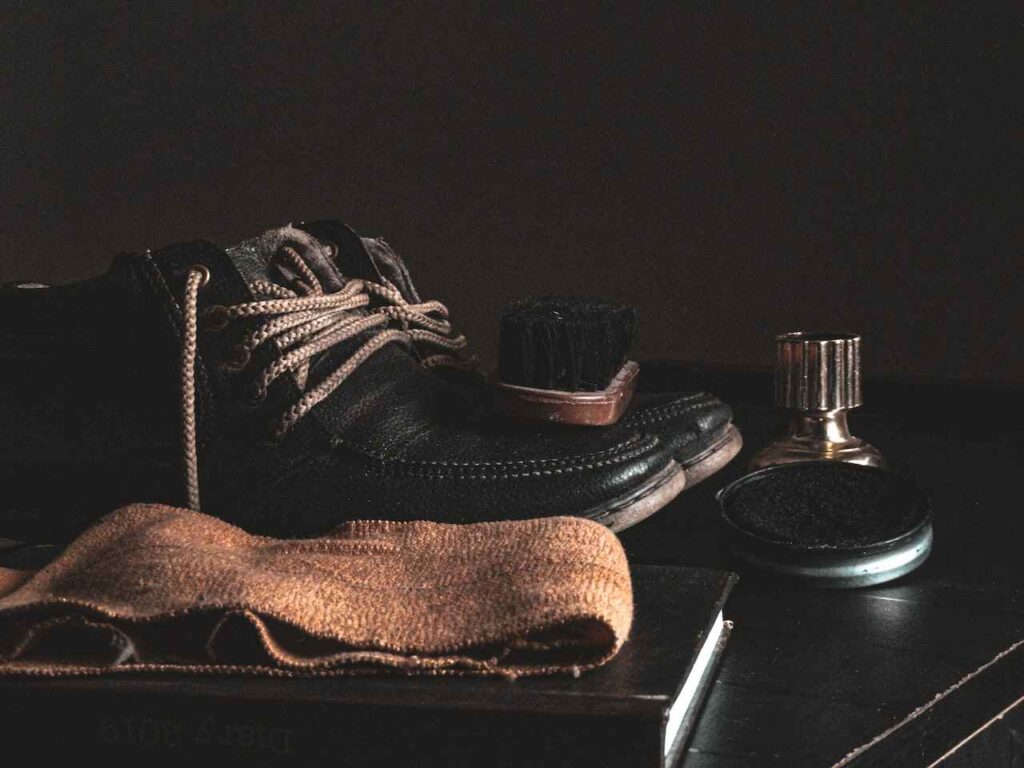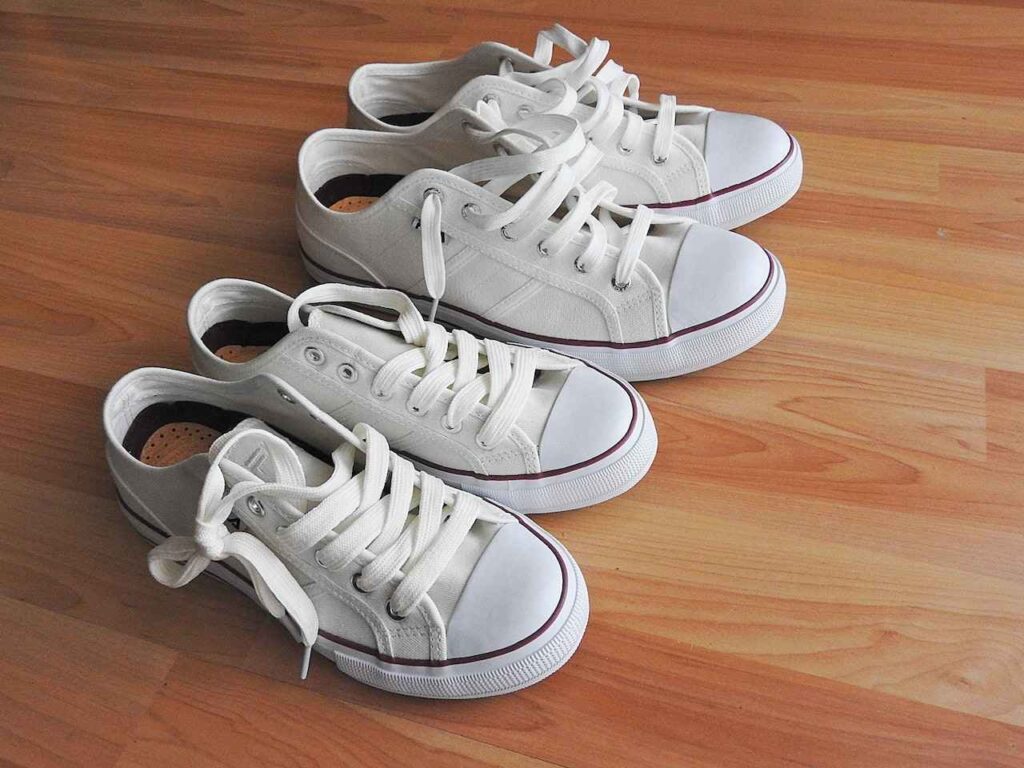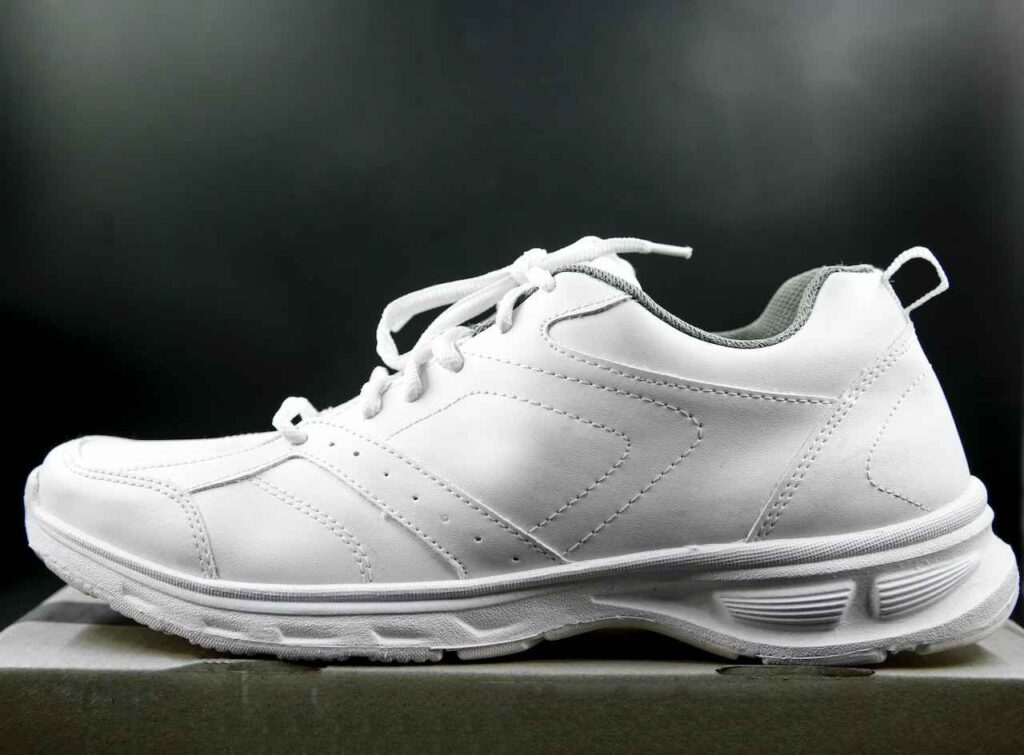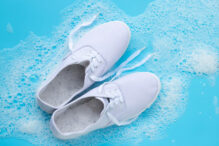Yes, dry cleaners can clean shoes. Dry cleaning professionals have the expertise to clean and restore various types of shoes, ensuring they look fresh and well-maintained.
Keeping your shoes clean and presentable is essential for maintaining a polished and professional appearance. While regular cleaning methods may work for some footwear, others require more specialized care. This is where dry cleaners come in. With their expertise in fabric care, dry cleaners extend their services to include shoe cleaning.
From leather to suede and even delicate materials, dry cleaners have the skills needed to clean and restore shoes effectively. By entrusting your shoes to a dry cleaner, you can be confident that they will be treated with care and attention to detail, ensuring they look their best. We will explore the process of shoe cleaning at dry cleaners and the benefits it offers in terms of convenience and results.
Understanding Dry Cleaning Processes
Dry cleaning is a popular method of cleaning delicate and difficult-to-clean garments. While most people are familiar with dry cleaning clothes, there is often confusion about whether dry cleaners can clean shoes as well. In this section, we will explore the different processes involved in dry cleaning and shed light on whether dry cleaners can effectively clean shoes.
Explaining The Different Solvents Used In Dry Cleaning
Dry cleaning wouldn’t be possible without the use of solvents to remove stains and dirt from clothing. Here are the main types of solvents used in dry cleaning:
- Perchloroethylene (perc): This is the most commonly used solvent in dry cleaning. Perc is effective in removing a wide range of stains and is known for its ability to preserve the shape and texture of clothing.
- Hydrocarbon solvents: These solvents are petroleum-based and offer a safe alternative for dry cleaning. They are often used as a more environmentally friendly option.
- Liquid carbon dioxide (co2): Dry cleaners also use liquid co2 as a solvent, which is a much greener alternative. This method uses liquid co2 under high pressure, allowing it to act as a cleaning agent.
Addressing The Potential Challenges Of Cleaning Shoes
While dry cleaners excel in cleaning clothing items, cleaning shoes presents unique challenges due to their material, construction, and level of dirtiness. It is important to note that not all dry cleaners offer shoe cleaning services. Here are some potential challenges when it comes to cleaning shoes at a dry cleaner:
- Material compatibility: Different types of shoes, such as leather, suede, or canvas, require specific cleaning techniques and solvents. It is crucial for dry cleaners to possess the knowledge and expertise to handle various shoe materials and treat them accordingly.
- Stain removal: Shoes often acquire stubborn stains and dirt that may be difficult to remove. Dry cleaners need to employ specialized techniques and solvents to effectively remove these stains without causing damage to the shoe material.
- Structure and design: The intricate structure and design of shoes can make cleaning a complex task. Dry cleaners must possess the necessary skills and equipment to carefully clean and restore the shape of shoes without altering their original form.
- Odor removal: Shoes may also develop unpleasant odors over time. Dry cleaners need to address this issue by using deodorizing techniques or specialized cleaning agents to eliminate any undesirable smells.
While dry cleaners specialize in cleaning a wide range of garments, their ability to effectively clean shoes may vary. It is important to consult with a dry cleaner who offers shoe cleaning services and has the expertise to handle the unique challenges associated with cleaning different types of shoes.

Can Dry Cleaners Clean Shoes
When it comes to getting our shoes professionally cleaned, we often think of shoe repair shops or specialty shoe cleaning services. But have you ever wondered if dry cleaners can also handle shoe cleaning? Let’s explore the services offered by dry cleaners and find out if they have the necessary equipment and expertise to clean shoes effectively.
Exploring The Services Offered By Dry Cleaners
Dry cleaners are primarily known for their expertise in cleaning and maintaining various types of fabrics and garments. However, many dry cleaners also offer a range of additional services, including shoe cleaning. Here are some key points to consider:
- Dry cleaners typically use different cleaning methods for shoes compared to clothing items. They may employ specialized cleaning solvents or detergents that are specifically formulated for shoe materials.
- In addition to cleaning the exterior of the shoes, dry cleaners can also address other issues such as removing stains, deodorizing, and conditioning leather or suede surfaces.
- Some dry cleaners offer shoe repair services, including fixing scuffed soles, replacing worn-out heels, or even re-coloring faded leather.
Do Dry Cleaners Have The Necessary Equipment And Expertise
Dry cleaners invest in specialized equipment and have trained technicians who understand the intricacies of different fabrics and materials. Here’s what you need to know:
- Dry cleaners utilize various tools and machinery that are specifically designed for cleaning different types of shoes. This equipment helps them to effectively remove dirt, grime, and stains without causing damage to the shoes.
- Dry cleaners have the expertise to handle a wide range of shoe materials, including leather, suede, canvas, and fabric. They understand the cleaning requirements and techniques that are suitable for each type of material.
- Professional dry cleaners are trained to identify potential issues or damage that may need to be addressed during the cleaning process. This expertise ensures that your shoes are cleaned thoroughly and any necessary repairs are handled skillfully.
Factors To Consider When Choosing A Dry Cleaner For Shoe Cleaning
If you’re considering taking your shoes to a dry cleaner, here are some factors to keep in mind:
- Reputation: Look for a dry cleaner with positive customer reviews and a good reputation for shoe cleaning. Word of mouth recommendations can be particularly helpful in finding a reliable option.
- Specialization: Some dry cleaners specialize in shoe cleaning and repair, offering a higher level of expertise in this area. Consider seeking out these specialized services for your shoes.
- Pricing: Compare the prices offered by different dry cleaners to ensure you are getting a fair deal. However, remember that quality should come first when it comes to shoe cleaning.
- Convenience: Consider the location and operating hours of the dry cleaner. Choose one that is convenient for drop-off and pick-up, allowing you to easily fit shoe cleaning into your schedule.
Dry cleaners can indeed clean shoes. With their specialized equipment, cleaning methods, and knowledgeable staff, they are well-equipped to handle the cleaning and maintenance of various types of shoes. Just make sure to choose a reputable dry cleaner that specializes in shoe cleaning and repair for the best results.
The Process of Cleaning Shoes at a Dry Cleaner
Detail the steps involved in cleaning shoes:
When you bring your shoes to a dry cleaner, the process begins with a thorough inspection. They look for stains, scuffs, and damage. This helps them decide on the best cleaning approach. After the inspection, the cleaning process starts. They use various techniques depending on the shoe’s material. Leather or suede shoes often get a gentle brushing and spot cleaning. Delicate fabrics like silk may require hand-cleaning.
Next, there’s a more comprehensive cleaning phase. This can involve mild cleaning solutions or dry-cleaning methods. Special treatments follow, tailored to the shoe material. Leather shoes receive moisturizing and conditioning. Suede shoes get brushed to restore texture. Delicate embellishments are protected.
The shoes are then dried carefully to prevent moisture damage. All of this ensures your shoes return in pristine condition.
Discuss the potential cleaning methods and techniques:
Dry cleaners employ different methods depending on the shoe’s material. For leather shoes, brushing and spot cleaning are common. Suede shoes undergo brushing and spot cleaning. Delicate materials like silk require gentle hand-cleaning.
Special care is taken with embellished shoes to protect delicate details.
Mention any special treatments for different materials:
Special treatments cater to various materials. Leather shoes receive moisturizing and conditioning to maintain suppleness and shine. Suede shoes are brushed to restore their texture. Delicate fabrics like silk are hand-cleaned.
Embellished shoes get extra protection to safeguard delicate elements during cleaning.
Benefits Of Getting Shoes Professionally Cleaned
When it comes to maintaining the quality and appearance of your shoes, getting them professionally cleaned at a dry cleaner can offer several benefits. Whether you have expensive leather shoes or delicate suede ones, entrusting them to the hands of professionals can have a significant impact on their lifespan and overall condition.
Here are some key reasons why opting for professional shoe cleaning services is worth considering:
Extending The Lifespan Of Your Shoes
- Proper cleaning techniques: Professional shoe cleaners have the knowledge and expertise to handle different types of shoes and materials. They are well-versed in the proper cleaning techniques, which help to prevent any damage that may occur from mishandling or using inappropriate cleaning agents. By entrusting your shoes to these experts, you can ensure that they are treated with care and professionalism, ultimately extending their lifespan.
- Removal of dirt and debris: Shoes tend to accumulate dirt, dust, and debris over time, which can cause the materials to deteriorate if not properly cleaned. Professional cleaners have the necessary tools and cleaning solutions to effectively remove these contaminants, preventing them from causing any long-term damage to your beloved shoes.
Removing Tough Stains And Odors Effectively
- Specialized stain removal: Whether it’s a pesky red wine stain or a stubborn oil mark, professional shoe cleaners have the expertise to tackle even the toughest stains. They are equipped with specialized cleaning solutions and techniques that can effectively eliminate the stains, restoring your shoes to their original pristine condition.
- Odor elimination: Shoes can develop unpleasant odors due to sweat, bacteria, and other factors. Professional cleaners can effectively combat these odors, eliminating the source of the smell and leaving your shoes fresh and odor-free. By getting rid of these unpleasant odors, you can enjoy wearing your shoes without any self-consciousness.
Restoring The Original Appearance Of Your Shoes
- Renovation of worn-out shoes: Over time, shoes can start to look worn-out and lose their original luster. Professional cleaners can breathe new life into your shoes by restoring their original appearance. Through techniques such as stain removal, polishing, and conditioning, they can revive the color, texture, and shine of your shoes, making them look brand new once again.
- Attention to detail: Professional shoe cleaners pay attention to every aspect of your shoes. They clean not only the visible surfaces but also hard-to-reach areas and intricate designs. This meticulous cleaning ensures that every part of your shoes is restored, leaving no room for hidden dirt or stains.
By getting your shoes professionally cleaned, you can not only prolong their lifespan but also ensure that they always look their best. The expertise of professional cleaners in handling different materials, removing tough stains, and rejuvenating worn-out shoes is unmatched.
So, instead of taking the risk of diy cleaning or neglecting your shoes, why not opt for professional services and give your shoes the care they deserve?

Risks and Considerations
Outline the potential risks of using a dry cleaner for shoes:
Using a dry cleaner for shoe cleaning can come with some risks. Delicate shoes with intricate details may suffer damage. The cleaning process, if not careful, can harm materials or decorations. Leather or suede shoes can lose color or texture. There’s also a risk of structural damage. Certain components, like glued soles or inner linings, can be affected. Heat or moisture can distort shoe shape. Material misjudgment can lead to irreversible damage.
Mention any precautions to take when opting for this service:
To minimize risks, consider these precautions. Choose an experienced dry cleaner familiar with various shoe types. Communicate any concerns about your shoes. Inquire about their policy for handling potential damages. Test the process with less valuable shoes first.
Discuss the impact on shoe materials and longevity:
Dry cleaning can have positive and negative effects. It can remove stains, dirt, and odors, extending a shoe’s life. However, the use of chemicals and processes can gradually impact materials. Leather may lose natural oils, affecting suppleness. Improper drying can lead to moisture-related issues. Choosing a reputable dry cleaner with controlled drying can mitigate these problems.
Alternatives To Dry Cleaners For Shoe Cleaning
When it comes to cleaning our shoes, many of us rely on the services of professional dry cleaners. However, there are alternative methods that can help us keep our shoes clean and well-maintained without the need for external assistance. In this section, we will explore some diy methods for cleaning shoes at home, the use of specialized shoe cleaning products, and the limitations of non-professional shoe cleaning.
Diy Methods For Cleaning Shoes At Home
- Brushing: Regularly brushing your shoes will help remove any loose dirt and debris. Use a soft-bristle brush and gently sweep away the dirt from the surface of your shoes.
- Spot cleaning: If you notice any stains or spots on your shoes, you can use mild soap and water to clean them. Create a mixture of warm water and a small amount of gentle soap, then use a clean cloth or sponge to dab the solution onto the affected area. Gently rub the spot in a circular motion until it is clean, then wipe away any excess moisture with a dry cloth.
- Deodorizing: To eliminate odors from your shoes, sprinkle some baking soda or cornstarch inside them. Let it sit overnight to absorb any unpleasant smells. In the morning, shake out the powder and your shoes will be fresh-smelling once again.
- Removing scuff marks: If your shoes have scuff marks, you can try using a pencil eraser to remove them. Simply rub the eraser gently over the scuff mark until it disappears. For stubborn scuffs, you can also use a small amount of rubbing alcohol on a clean cloth and gently wipe the area.
Exploring The Use Of Specialized Shoe Cleaning Products
- Shoe cleaning kits: There are various shoe cleaning kits available in the market that include specialized brushes, cleaning solutions, and protective sprays. These kits are designed to meet the specific needs of different types of shoes and can provide effective cleaning and protection.
- Sneaker cleaners: Sneaker enthusiasts can find specialized sneaker cleaners that are formulated to clean and restore the appearance of sneakers. These cleaners help remove dirt, stains, and scuffs without causing damage to the material or color of the shoes.
- Suede cleaners: Suede shoes require extra care and attention. Suede cleaners are specifically formulated to clean and revive the delicate suede material. They help remove dirt, stains, and restore the soft texture of suede shoes.
Understanding The Limitations Of Non-Professional Shoe Cleaning
- Time and effort: Cleaning your shoes at home requires time and effort. It may take several rounds of cleaning to achieve the desired results, especially for heavily soiled shoes or those with deep stains.
- Risk of damage: Non-professional shoe cleaning methods come with the risk of causing damage to your shoes, especially if you are not familiar with the material and specific cleaning requirements. Certain materials, such as delicate leather or suede, may require professional expertise to avoid any irreversible damage.
- Limited effectiveness: While diy methods and specialized shoe cleaning products can be effective to a certain extent, they may not always provide the same level of thorough cleaning as professional dry cleaners. Stubborn stains or deep-seated dirt may require the expertise and equipment of professional cleaners.
While professional dry cleaners offer convenience and expertise in shoe cleaning, there are viable alternatives that can be pursued at home. Diy methods, specialized shoe cleaning products, and a clear understanding of their limitations can help us maintain clean and well-cared-for shoes without relying solely on professional assistance.
Preparing Your Shoes For Dry Cleaning
When it comes to getting your shoes dry cleaned, there are a few essential steps you need to take beforehand. Properly preparing your shoes for dry cleaning ensures that the cleaning process goes smoothly and your shoes come out looking their best.
Here are the key points to keep in mind:
Checking For Any Damages And Repairs Needed
Before taking your shoes to the dry cleaners, it’s important to thoroughly inspect them for any damages or repairs needed. This includes checking for loose stitching, worn-out soles, or any other visible signs of wear and tear. If you come across any issues, it’s best to have them repaired before sending them in for cleaning.
This way, you can avoid the risk of further damage during the cleaning process.
Removing Shoelaces And Other Detachable Elements
To ensure thorough and effective cleaning, it’s crucial to remove any detachable elements from your shoes before taking them to the dry cleaners. This includes shoelaces, insoles, and any other removable parts. By doing this, you allow the dry cleaner to focus on cleaning the main components of your shoes without the risk of tangling or damaging the smaller parts.
Additionally, removing shoelaces makes it easier to clean the entire shoe, including the tongue and eyelets.
Communicating Any Specific Cleaning Instructions To The Dry Cleaner
Each pair of shoes is unique, and some may require special care when it comes to cleaning. Whether you have delicate materials, intricate designs, or specific cleaning instructions from the manufacturer, it’s important to communicate these details to the dry cleaner.
Provide any necessary information about the materials used in your shoes, any specific cleaning methods to be followed, and any areas that require extra attention. This ensures that the dry cleaner can handle your shoes appropriately and delivers the best possible results.
To sum it up:
- Thoroughly inspect your shoes for any damages or repairs needed.
- Remove shoelaces and other detachable elements.
- Communicate any specific cleaning instructions to the dry cleaner.
Preparing your shoes for dry cleaning may seem like a small step, but it plays a vital role in ensuring that your shoes receive the proper care they need. By following these steps, you can help the dry cleaner deliver exceptional results, leaving your shoes looking clean, refreshed, and ready to wear.

Post-Cleaning Care For Shoes
After you’ve had your shoes professionally cleaned at a dry cleaner, it’s essential to take proper care of them to ensure they stay in good condition for as long as possible. Here are some tips for storing and maintaining freshly cleaned shoes:
- Proper storage: Store your shoes in a cool, dry area away from direct sunlight. Avoid storing them in plastic bags, as they can trap moisture and cause damage. Instead, use cloth shoe bags or acid-free tissue paper to help maintain their shape and prevent any unwanted creases.
- Regular cleaning routine: Incorporate a regular cleaning routine to prevent dirt and grime buildup on your shoes. Wipe them down with a soft cloth or brush after each use to remove any surface dirt. This simple step can go a long way in prolonging the life of your shoes and maintaining their appearance.
- Using protective sprays or coatings: To provide an extra layer of protection, consider using a quality waterproof spray or a specific shoe protectant spray. These products help repel water, oil, and stains, minimizing damage caused by spills or exposure to the elements. Follow the manufacturer’s instructions for the best results.
- Recommended cleaning schedule: Different types of shoes require different levels of care and cleaning frequency. Here’s a general guideline for how often you should clean various types of shoes:
- Sneakers and athletic shoes: Clean every two to three weeks, or as needed.
- Leather shoes: Polish every two to three months, and clean with a leather cleaner once a year.
- Suede or nubuck shoes: Brush gently after each use to remove surface dirt, and use a specialized suede cleaner as needed.
- Canvas shoes: Wash in the washing machine on a gentle cycle, if possible, or hand wash when necessary.
Remember, these are just general recommendations, and the actual cleaning and maintenance needs may vary based on the specific shoe material, usage, and environmental factors.
By following these post-cleaning care tips for your shoes, you can extend their lifespan and keep them looking fresh and well-maintained. So, don’t neglect the importance of proper care after a trip to the dry cleaner. Take the time to give your shoes the attention they deserve, and they’ll reward you with longevity and style.
How to Choose a Reputable Dry Cleaner for Shoes
Tips for selecting a trustworthy dry cleaner
Choosing the right dry cleaner is crucial. Seek recommendations from friends or online reviews. Visit in person to gauge cleanliness and professionalism. Experience matters, so ask about their history with shoe cleaning. Inquire about their cleaning methods and products. Transparency is key; they should be open to your questions. Ask about guarantees and insurance for potential damages. Compare prices among different dry cleaners. Look for eco-friendly cleaning options.
Suggest questions to ask before entrusting your shoes to a dry cleaner
Before leaving your shoes with a dry cleaner, ask some vital questions. Start by asking about their experience. How long have they been cleaning shoes, and have they handled similar shoes before? Discuss their cleaning methods, especially for delicate fabrics or embellished shoes. Inquire about their approach to handling potential damage. Ask about the expected turnaround time. Find out if they offer additional services like repairs or odor removal. These questions ensure you’re choosing an experienced, transparent, and reliable dry cleaner for your shoes.
Frequently Asked Questions
What Types Of Shoes Can Be Cleaned By Dry Cleaners?
Dry cleaners offer shoe cleaning services for a wide range of shoe types, including:
- Leather shoes: Whether it’s dress shoes, boots, or loafers, dry cleaners are equipped to handle cleaning and conditioning leather footwear.
- Suede shoes: Dry cleaners have specialized methods to clean and restore the appearance of suede shoes, removing dirt, stains, and scuffs.
- Fabric shoes: From canvas sneakers to cloth flats, dry cleaners can effectively clean fabric shoes, refreshing their look and getting rid of any lingering odors.
- Athletic shoes: Dry cleaners can clean athletic shoes, removing dirt, mud, and sweat stains, and bringing back their original freshness.
- Designer shoes: Dry cleaners have the expertise to handle high-end designer footwear, taking special care to clean and preserve their quality materials and craftsmanship.
No matter what type of shoes you have, it’s worth checking with your local dry cleaner to see if they offer shoe cleaning services. They may have specific expertise in dealing with unique materials or styles.
Can Dry Cleaning Services Remove Scuff Marks From Shoes?
Yes, dry cleaning services can effectively remove scuff marks from shoes. Dry cleaners have various techniques at their disposal to tackle scuffs and restore the shoes’ appearance. Some of the methods they may use include:
- Spot treatments: Dry cleaners can target specific scuff marks with specialized cleaning solutions.
- Brushing and buffing: By gently brushing and buffing the scuffed areas, dry cleaners can often restore the shoe’s original shine and remove minor scuff marks.
- Stain removal: In cases where scuffs have caused discoloration or stains, dry cleaners can employ stain removal techniques to eliminate the marks.
It’s important to note that the success of scuff removal may depend on the severity of the scuffs and the shoe’s material. It’s always recommended to consult with a professional dry cleaner to assess the best approach for your specific shoes.
How Long Does It Typically Take For Dry Cleaners To Clean Shoes?
The time required for dry cleaners to clean shoes can vary depending on a few factors:
- Workload: If the dry cleaner has a high volume of shoes to process, it may take longer to complete the cleaning.
- Complexity: Certain types of shoes, such as those with delicate materials or intricate designs, may require more time and attention during the cleaning process.
- Additional services: If you request additional services, such as deep conditioning or stain removal, it may extend the cleaning time.
In general, dry cleaners aim to provide a quick turnaround for shoe cleaning services. Many establishments can clean and return shoes within a few days. However, it’s best to inquire directly with your chosen dry cleaner to get a more accurate estimate based on their current workload and the specific requirements of your shoes.
Remember, dry cleaning your shoes can not only extend their lifespan but also give them a fresh and polished appearance. So, don’t hesitate to give your beloved footwear the care they deserve by taking them to a reputable dry cleaner.
Frequently Asked Questions On Do Dry Cleaners Clean Shoes
Do Dry Cleaners Clean Shoes?
Yes, most dry cleaners provide shoe cleaning services. They have special techniques and equipment to handle different types of shoes, including leather, suede, and fabric. Dry cleaning can help remove dirt, stains, and odors from your shoes, making them look clean and fresh.
How Often Should I Get My Shoes Dry Cleaned?
It is recommended to get your shoes dry cleaned every few months, or as needed. The frequency depends on how often you wear them and the condition of the shoes. Regular dry cleaning helps maintain the quality and appearance of your shoes, extending their lifespan.
Can Dry Cleaners Remove Stains From Shoes?
Yes, dry cleaners are skilled in removing stains from shoes. Whether it’s a coffee spill, grass stain, or oil mark, they have the expertise to tackle various types of stains. However, it’s important to communicate the type of stain and provide any necessary information to help them achieve the best results.
Conclusion
Entrusting your shoes to a dry cleaner can be a convenient and effective way to clean them. Dry cleaners have the necessary equipment and expertise to remove stubborn stains and restore the freshness of your shoes. Whether you have leather, suede, or fabric shoes, professional dry cleaners can clean them without causing any damage.
Additionally, they may offer additional services such as polishing, repairing minor damages, or applying protective coatings. Remember to communicate any specific instructions or concerns to ensure the best possible outcome. By using a dry cleaner for your shoe cleaning needs, you can enjoy clean, fresh shoes that look and feel like new.
Say goodbye to dirty and smelly shoes and let the professionals handle the task. Don’t hesitate to reach out to your local dry cleaner and give your shoes the care they deserve.


